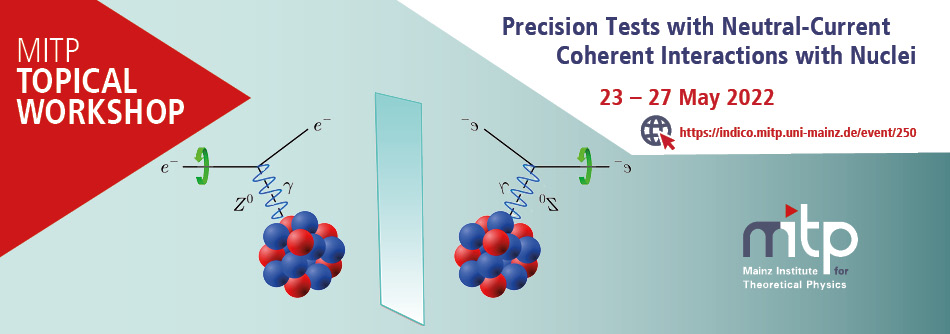- Coherent neutrino-nucleus scattering helps isolating the pure weak neutral current interaction. After the first recent observation of elastic coherent neutrino-nucleus scattering by the COHERENT collaboration, other experiments are underway. We will discuss the physics reach of these experiments and relate them to other neutrino experiments (e.g., at Fermilab and J-PARC).
- Physics of neutron skins: Along with the PREX and CREX collaborations at Jefferson Laboratory (JLab), measurements of neutron skins with PVES at MAMI and MESA and corresponding nuclear structure calculations constitute an important part of the physics program in Mainz.
- Electron and muon nucleus interactions: The proton radius puzzle suggests that muons may feel the proton being smaller than electrons do. A similar situation is observed for the deuteron, but not for helium isotopes. The MUSE experiment at PSI is dedicated to a direct comparison of e± and μ± scattering off the proton within the same experiment. Ongoing activity aimed at improving the precision of proton and deuteron charge radii using electron scattering is one of the core topics of the Mainz experimental program.
- Parity violation in atomic systems with the goal of determining weak nuclear charges and anapole moments in chains of isotopes is also a strong component of research in Mainz. The interpretation of experimental results relies upon atomic theory calculations and requires a good knowledge of the neutron distribution in heavy nuclei.
Confirmed speakers include Andrei Afanasev (George Washington University), Baha Balantekin (University of Wisconsin, Madison), Franziska Hagelstein (Paul Scherrer Institut, Villigen), Gaute Hagen (Oak Ridge National Laboratory), Doris Jakubassa (LMU München), Krishna Kumar (Stony Brook University), William Marciano (Brookhaven National Laboratory), Jorge Piekarewicz (Florida State University), Marianna Safronova (U. Of Delaware), Kate Scholberg (Duke University), Nik Berger (JGU)
